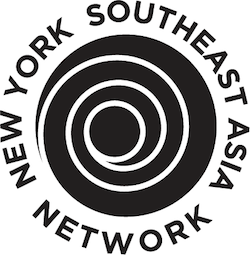‘For me, who grew up and became an adult during the New Order period, I was conscious of a historical and political absurdity. I began to feel that there were some Indonesians who had become invisible.’

September 24, 2015
Leila S. Chudori’s novel Home, originally titled Pulang in Indonesian and translated by John McGlynn, is out from Deep Vellum Press this October. Read a long excerpt from Home in The Margins’ series on Indonesian Literature in Translation.
The year was 1988 and I had traveled to Paris on my way back home to Jakarta after graduating from Trent University in Ontario, Canada. At Rue de Vaugirard, in Paris’s sixth arrondissement, stood the restaurant Indonésia, a cooperative set up six years prior, in 1982, by Indonesian political exiles who had fled to Paris in the 1960s: Oemar Said, Sobron Aidit, J.J. Kusni, and Sudharsono. It was through my encounter with that restaurant that the novel Pulang or Home was born.
As someone born in 1962, I’d only been told about September 30, 1965, as an incident that Suharto’s New Order government called the G30S/PKI. That day, a coup was attempted by a group that later became famous as Gerakan 30 September. Six army generals were assassinated and the military, then in the control of Suharto, blamed the coup on the Indonesian Communist Party, the PKI, and sustained a propaganda campaign to stoke anti-communist sentiments. What followed was a horrifying pogrom against communists and communist sympathizers sustained from that year to 1967, through which up to one million Indonesians were brutally killed and one million more imprisoned.
For 32 years, the rulers of Indonesia under the New Order insisted on their version of what took place in 1965. Not only was the coup attributed squarely to the PKI, but the anti-communist massacre that followed was wiped from history books and from the media. The New Order even called the failed coup “Gestapu.” I do not ever recall anybody who ever questioned this one-sided version of history—that is, if they were concerned about their personal safety. Everything that was considered to be leftist, left-leaning, Communist-leaning, or ‘Red’ could only be spoken of in hushed tones. One felt that if anyone spoke about these things in a loud voice, the country would suddenly be swallowed by the earth.
In 1984, the New Order government sponsored the production of a docudrama film depicting the government’s official explanation of the coup. The three-and-a-half hour film, titled “Pengkhianatan G30S/PKI,” which translates to Treachery of G30S/PKI, became mandatory viewing for school children on September 30 of each year until Suharto’s fall in 1998.
Over the years many alternate interpretations arose to explain the coup, including the existence of a CIA plot to overthrow Sukarno, who was forced to resign. But the propagation of one official New Order narrative meant that the stories of those who faced the brutality of the anti-communist killings and those who fled Indonesia in 1965 and were never able to return were erased.
I did not know anything about thousands of Indonesian people abroad who could not get home, whose passport were revoked and became political exiles all over Europe, China, and Cuba. My trip to Paris in 1988 marked the first time I learned about Indonesian political exiles in Europe.
When I joined Tempo magazine as a journalist in 1989, I got to know more of this unwritten history. I met Pak Amarzan Loebis, an artist who was held on Buru Island for eleven years, who at that time had to use an alias whenever he wrote for Tempo or Matra. I also knew of children of political prisoners who worked at major media outlets in Indonesia, Tempo included, who had to change their names or intentionally avoid using their family name.
It was then that I first became aware of an incredibly absurd concept called Bersih Diri, clean self, and Bersih Lingkungan, clean environment, which was issued by the Ministry of Home Affairs. This policy banned people who were deemed “unclean” (political prisoners, members of the Indonesian Communist Party or PKI, or similar organizations) or who were “unclean by association” (the families of political prisoners) from becoming members of the Indonesian military (TNI) or national police, teachers, priests, or entering professions which could influence the public. Because of this regulation, discrimination was not only directed against former political prisoners of the 1965 tragedy, but also towards their grandchildren. In order to ensure that this system persisted, former political prisoners had the code ET (Ex-Political Prisoner) emblazoned on their national identity cards. To check that they were ‘Clear of Association’ a prospective employee would be subject to a special investigation.
My days as a Tempo reporter during the New Order period were strange and absurd. It was a stressful and interesting time for someone like me, who was still young. I say strange because we were trained to become reporters with integrity, but at the same time we knew— back then—that we could not write freely and extensively about, let’s say, the businesses of the president’s family; nor to mention or criticize or come out against government policies which benefited his cronies. This was especially true when it came to questioning matters connected with the events of September 30, 1965. Once, Tempo dared to skirt danger by touching upon the behavior of the president’s family. Afterwards we had to ‘lay low’ for a few weeks before we tried to do anything similar.
I began to feel that there were some Indonesians who had become invisible. They were Indonesian citizens but their rights were denied by the government and in turn by the public, who for decades had been brainwashed that anything associated with communism was denying God. For me, who grew up and became an adult during the New Order period, I was conscious of a historical and political absurdity.
Tempo was banned by the government in June 1994, for a cover story about the purchase of used warships from East Germany. That story criticized the policy of the Minister of Research and Technology, BJ Habibie, but President Suharto took it personally. Some of my friends and I are still bitter about this incident. We felt that the source of our productivity was suddenly taken away. It was no surprise if we were among the tens of millions of Indonesians who were brimming with hope when university students occupied the House of Representatives (DPR) building in mid-May 1998, demanding that President Suharto step down.
I wanted to tell the story of those who had lived their lives as shadows through the New Order period. The novel Pulang commences at the beginning of 1965 —with several flashbacks to the 1950s—and ends in the year 1998. I was determined to tell the story of two generations, the generation represented by Dimas Suryo, who lives through the events of September 1965 and the generation of his daughter, Lintang Utara, who comes back to Indonesia in 1998.
I wanted to tell the story of political exiles who could not return home. Those who lived far from their homeland but still felt they were a part of Indonesia, no matter what kind of passports they were issued and no matter how the government treated them.
I became better acquainted with Oemar Said, Sobron Aidit and their friends who had established the restaurant Indonésia in Paris as a part of their resistance as political exiles. I used them, and especially Oemar Said, as the ‘model’ in the novel for a group of political exiles consisting of Dimas Suryo, Nugroho Dewantoro, Tjai Sin Soe, and Mohammad Risjaf. In Pulang, the story goes that while they were on a trip as reporters to Santiago, Chile, the bloody September 30, 1965 incident took place back home. Their passports were revoked, after which they had to move from country to country, until they finally settled in Paris.
Pulang is a work of fiction, not a history book, a memoir, or a biography. Even so, I’ve spent six years researching and writing—in the midst of my work as a journalist at Tempo and as a mother. The exiles and prisoners I spoke to agreed to and supported my desire to write a novel.
What I have taken from their stories are the feelings and psyche of a political exile. Through Dimas Suryo’s character, I hoped to convey a sense of how Indonesia remained in the hearts and souls of these exiles during their time in Paris. Each year Dimas applies for a visa in order to be able to return to Indonesia, but he fails time and time again.
From the outset I had decided that Pulang was not going to be a passionate novel about ideology. I did not want to put on any pretenses of wanting to join the political discussion. For me, that is not a novelist’s job. A novelist is a storyteller, not a historian or a politician who unleashes propaganda. The story is about the characters, the figures. I am just the medium.
I felt I owed it to myself to find out about the black hole that had been covered up for 32 years by the New Order, the story of the suffering of those whose ‘voices may not be heard’, and ‘whose bodies may not be seen,’ who are not recorded in history. As Bagus Takwin, a lecturer in the at the University of Indonesia, has said, this novel is about “those who were not counted in the collective known as Indonesia.”
These ‘voices of the unheard’ become the preoccupation of Lintang Utara, the second generation Indonesian daughter of Dimas Suryo who has lived her whole life in Paris. Lintang is in her final year at the Sorbonne when she decides to go to Indonesia. For me, Lintang represents many youth of my generation, who intentionally made efforts to understand and change Indonesia. Lintang knows a part of Indonesia from her father’s stories, but ironically, his is a part of Indonesia’s history that is not written.
In Indonesia, Lintang meets with children of her father’s friends. She also realizes that she is facing a situation where she must define herself vis-à-vis the New Order establishment, something she rarely experienced while in Paris.
In a dinner scene in the novel, Lintang must choose whether to reveal herself and the history of her family in front of the Priasmoro family who insults ‘that Commie restaurant’ in Paris. Dinner time is a moment which has always drawn my attention, because this is often a time when family members insult or belittle one another. The family dinner becomes a stage for displaying power or frailty, or the cowardice or hypocrisy of family members.
Dinner in the Priasmoro house becomes a catastrophe, yet it reveals a truth. It becomes a source of pride and gives Lintang a definition about Indonesia and Indonesians. In Jakarta, too, Lintang sees Indonesia as it is. She sees daily protests and the terror her new friends face, before finally facing the May riots, which end with the resignation of President Suharto. When Lintang hears the sound of the university students occupying the DPR building she remarks, “The sound of those university students sounds so beautiful, much more powerful than a Ravel composition.”
The use of the word ‘pulang’ (home) in this novel not only represents Dimas Suryo and Lintang Utara, or even all of those who are not a part of the historical record. It represents all of us who want to take a step, however small, for Indonesia.
This series has been made possible by the Lontar Foundation and the New York Southeast Asia Network





